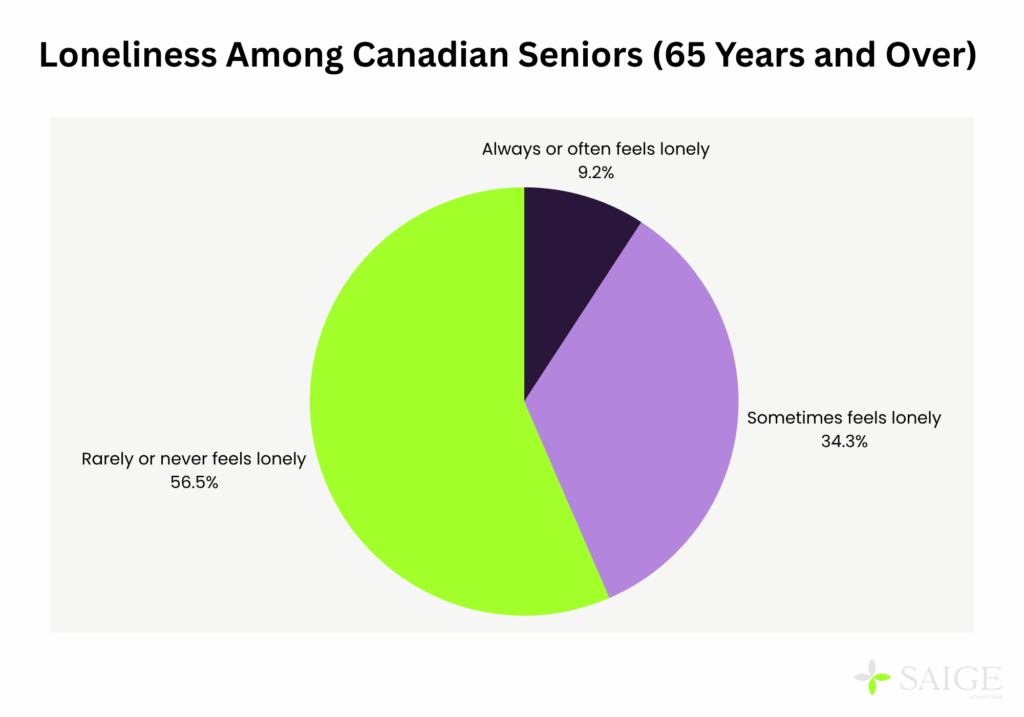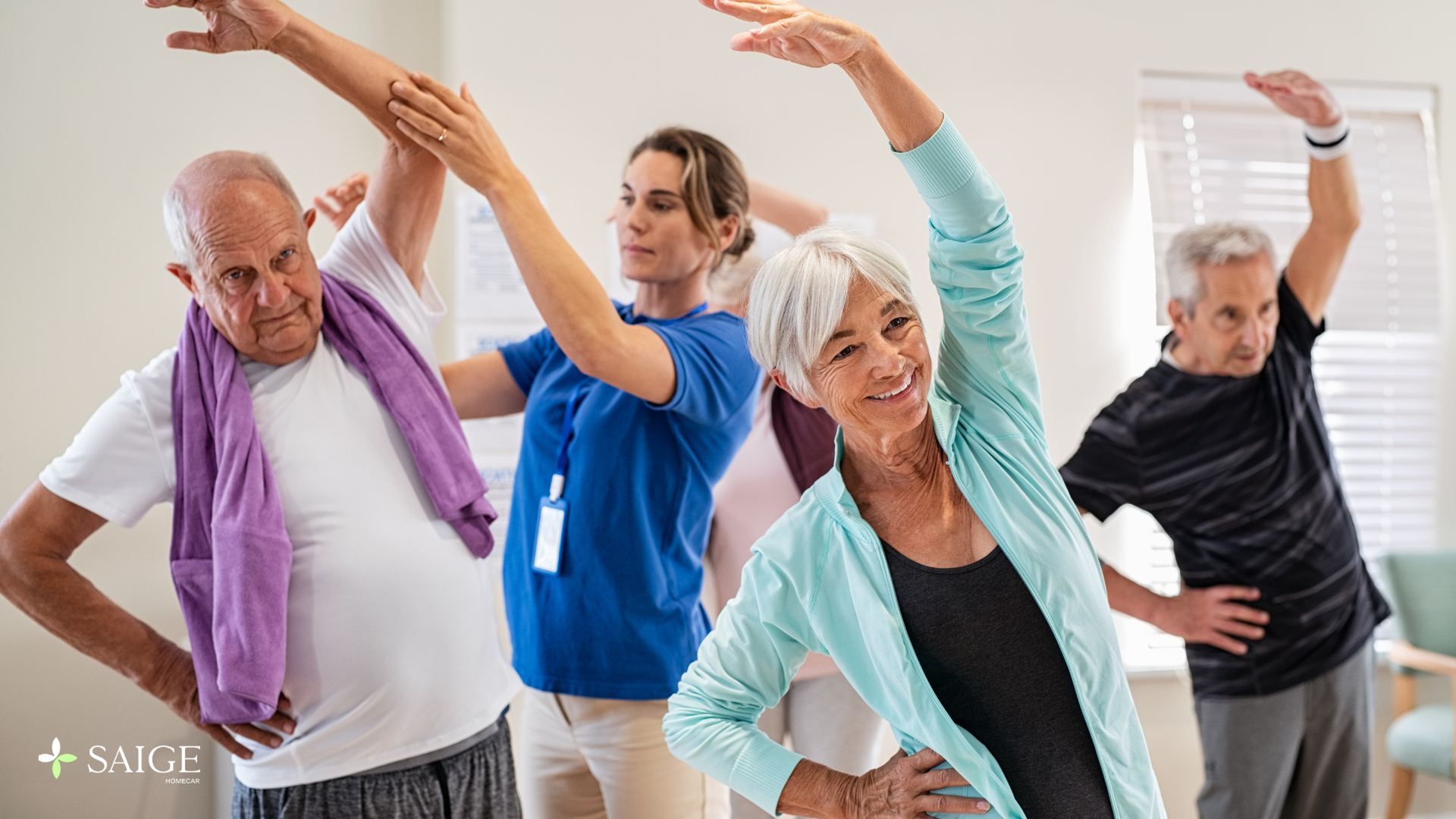Nearly one in five Canadian seniors experiences loneliness, and the number continues to rise.
In Calgary, where long winters and limited mobility can make isolation worse, group activities help older adults stay engaged, active, and emotionally supported through shared experiences.
From creative workshops to outdoor clubs, here’s how Calgary seniors can turn everyday moments into opportunities for connection.
Impact of Activities for Seniors on Loneliness

The above stat shows how bad the loneliness problem is for seniors, making it clear that we need to take action by engaging in social activities. This can have a powerful impact on our elders’ mental and emotional well-being, and here’s how:
- Social interaction: Group activities allow seniors to interact with others who share similar interests, helping them form new friendships and reducing feelings of isolation. Staying social as they age is essential for combating loneliness.
- Sense of belonging: Being part of a group helps seniors develop a sense of belonging to a community, combating feelings of loneliness and disconnection.
- Boosted self-esteem: Engaging in enjoyable activities that seniors excel at can boost their self-esteem and confidence, making them feel valued and appreciated.
- Mental stimulation: Group activities often involve learning new skills, engaging in discussions, or problem-solving together, keeping the mind active and reducing the risk of cognitive decline. However, lack of activity can lead to cognitive decline and increased loneliness.
- Support system: Being part of a group provides seniors with a support system where they can share their experiences, concerns, and joys with others who understand and care about them.
10 Group Activities for Seniors
As a caregiver, you have the power to help seniors combat loneliness by engaging them in various group activities. Here are 10 exciting and meaningful fun senior activities that you can organize to make a positive difference in their lives:
1. Book Club
Plan a weekly book club where seniors can discuss their favorite books, share insights, and engage in meaningful conversations. Encourage members to take turns selecting books and leading discussions. Consider incorporating themes or genres that appeal to the group’s interests.
Benefit: Stimulates cognitive function, promotes social interaction and fosters a love for reading.
2. Gardening Club
Create a gardening club where seniors can work together to maintain a communal garden. Provide adaptive tools for those with limited mobility, such as raised beds or ergonomic tools. Encourage members to share their knowledge and experiences with gardening.
Benefit: Encourages physical activity, promotes a sense of purpose, and provides opportunities for seniors to connect with nature.
3. Art and Crafts Workshops
Offer a variety of arts and crafts workshops, such as painting, knitting, or woodworking. Provide materials and guidance from skilled instructors. Encourage participants to explore their creativity and express themselves through their projects.
Benefit: Enhances creativity, improves fine motor skills, and provides a sense of accomplishment.
4. Exercise Classes
Organize gentle exercise classes such as chair yoga, tai chi, or stretching. Ensure the classes are led by certified instructors who can adapt movements to individual needs. Encourage participants to go at their own pace and celebrate their progress.
Benefit: Improves physical health, increases balance and flexibility, and promotes overall well-being.
5. Music Appreciation Sessions
Host music appreciation sessions where seniors can listen to and discuss various genres of music. Encourage them to share their favorite songs and memories associated with them. Consider inviting local musicians or music therapists to lead interactive sessions.
Benefit: Evokes positive emotions, promotes reminiscence, and encourages self-expression through music.
6. Cooking and Baking Classes
Arrange cooking and baking classes where seniors can learn new recipes, share their own, and enjoy the fruits of their labor together. Provide step-by-step instructions and adapt recipes to accommodate dietary restrictions.
Benefit: Fosters a sense of accomplishment, promotes social bonding, and encourages healthy eating habits.
7. Technology Workshops
Offer workshops that teach seniors how to use technology, such as smartphones, tablets, or social media. Provide patient instructors and hands-on practice. Encourage participants to ask questions and support one another in their learning process.
Benefit: Enables seniors to stay connected with loved ones, access resources, and engage with the digital world.
8. Volunteer Projects
Coordinate volunteer projects where seniors can contribute to their community, such as knitting blankets for hospitals or assembling care packages for the homeless. Partner with local organizations to identify meaningful projects that align with the group’s interests and abilities.
Benefit: Provides a sense of purpose, promotes fulfillment, and allows seniors to make a positive impact in their community.
9. Storytelling Sessions
Encourage seniors to share their life stories, experiences, and wisdom with the group. Record these stories to create a legacy for future generations. Consider organizing themed sessions or inviting guest speakers to inspire and facilitate discussions.
Benefit: Validates their experiences, strengthens social bonds, and preserves valuable memories and life lessons.
10. Game Nights
Host regular game nights featuring a variety of board games, card games, and brain teasers. Encourage friendly competition and teamwork. Consider introducing new games and adapting rules to accommodate different skill levels.
Benefit: Promotes cognitive stimulation, encourages social interaction, and provides opportunities for laughter and enjoyment.
11. Storytelling Circles
Organize regular sessions where seniors can share personal stories, life experiences, or family histories with the group.
Benefit: Fosters meaningful connections, boosts confidence, and preserves memories that can be cherished by the group.
12. Photography Club
Seniors can explore local parks, neighborhoods, or Calgary landmarks while taking photos and discussing techniques in a group setting.
Benefit: Encourages creativity, gentle physical activity, and social interaction while appreciating the outdoors.
13. Movie or Documentary Nights
Host group screenings of classic films, documentaries, or new releases, followed by casual discussions to share thoughts and opinions.
Benefit: Provides entertainment, sparks conversation, and creates opportunities for bonding in a relaxed setting.
14. Cultural Exchange Groups
Seniors can gather to share traditions, recipes, music, or stories from their cultural backgrounds, celebrating diversity together.
Benefit: Promotes learning, understanding, and social connection while honoring each participant’s heritage.
15. Birdwatching or Nature Walks
Organize small groups to enjoy local parks, green spaces, or walking trails while observing birds and nature.
Benefit: Supports gentle exercise, mindfulness, and appreciation of the natural environment, all while socializing with peers.
6 Advantages of Group Activities For Seniors
Engaging in group activities yields numerous benefits for seniors’ emotional, mental, and physical well-being.
| Benefits | Description |
| Reduced loneliness and isolation | Group activities provide vital social interaction and a sense of belonging, alleviating feelings of loneliness. |
| Improved mood and self-esteem | Engaging in enjoyable activities with others boosts mood, promotes a positive outlook, and enhances self-esteem. |
| Cognitive stimulation | Participating in mentally engaging pursuits like reading, learning, and strategic games keeps the mind sharp. |
| Increased physical activity | Group exercise classes and active hobbies encourage seniors to stay physically fit and mobile. |
| Enhanced sense of purpose | Contributing to the community through volunteer work or sharing skills gives seniors a renewed sense of purpose. |
| Expanded social network | Group activities introduce seniors to new friends and acquaintances, broadening their social support system. |
How Group Activities Benefit Caregivers
As a caregiver, engaging your clients in group activities can provide numerous benefits for both you and the seniors you care for. The list of benefits includes:
Reduced caregiving burden
- Actively involved seniors require less one-on-one attention
- Socially fulfilled seniors are more emotionally content and easier to care for
Enhanced job satisfaction
- Witnessing the positive impact of social engagement on seniors’ well-being
- Feeling a sense of accomplishment in promoting a better quality of life for your clients
Reassurance and peace of mind
- Knowing that seniors have a strong support network beyond their caregivers
- Confidence in seniors’ access to meaningful engagement and social interactions
Improved client cooperation
- Mentally stimulated and emotionally content seniors are more likely to adhere to care plans
- Positive working relationships between caregivers and clients
Opportunities for respite
- Group activities provide short periods of relief or breaks for caregivers
- Chance to recharge and avoid caregiver burnout while seniors are engaged in activities
Helping Your Senior Thrive
Loneliness is a silent struggle for many seniors, but it doesn’t have to be a permanent state. Engaging in group activities is a proactive way to combat social isolation, forge meaningful connections, and improve overall well-being.
By participating in pursuits like book clubs, exercise classes, volunteer projects, and creative workshops, seniors can rediscover a sense of belonging and purpose. As a home care services agency, we recognize the immense value of social engagement and strive to support our clients in finding fulfilling group activities.
“Combat loneliness and cultivate joy – join a group activity and empower seniors to thrive!”
Related Reads
Integration of Mental Health Awareness in Home Care Services in Calgary
The Importance of Social Interaction in Home Care Settings
FAQs About Group Activities For Seniors to Overcome Loneliness
Technology like video chat, social media, and online forums can help seniors stay connected with friends and family, meet new people with shared interests, and participate in virtual events and activities. User-friendly devices and training can make technology more accessible.
The elderly need opportunities for meaningful social interaction, a sense of belonging and purpose, and the ability to maintain relationships with family and friends. Engaging in hobbies, volunteering, and intergenerational connections can help meet these needs.
Offer a variety of accessible activities that cater to different interests. Provide transportation, encourage friends and family to join, and create a welcoming atmosphere. Highlight the benefits of social engagement for mental and physical health.
Activities for people with dementia should be tailored to their abilities and preferences. Examples include music therapy, art projects, gentle exercise, reminiscence therapy, sensory stimulation, and spending time outdoors. Focusing on enjoyment and social connection is key.
Pets provide companionship, reduce loneliness and depression, and encourage physical activity through walks and playtime. Caring for a pet gives seniors a sense of purpose and routine. Pets also facilitate social interaction with other animal lovers.
Regular exercise stimulates the production of brain chemicals like dopamine, norepinephrine, and serotonin, which boost mood, reduce stress and anxiety, and improve overall well-being. Exercise also promotes better sleep, increases energy levels, and provides a sense of accomplishment.
Seniors can stay active and engaged on their own through activities like walking, stretching, or home exercises, reading books, listening to music or podcasts, writing or journaling, cooking, exploring new hobbies, learning languages or skills, and taking online courses. These activities boost mental, emotional, and physical well-being.


